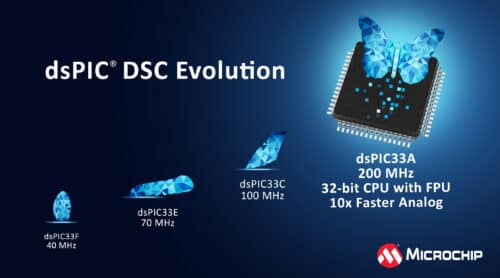Digital signal controllers improve efficiency in motor control, power conversion, and more across various industries.

As the complexity of embedded systems increases along with the demand for performance, Microchip Technology has introduced its dsPIC33A Core family of Digital Signal Controllers (DSCs). These controllers enable engineers to develop control algorithms for operational efficiency in applications such as motor control, power supply, charging, and sensing systems. The dsPIC33A family has a 32-bit CPU architecture with a 200 MHz operating speed and a Double-Precision Floating-Point Unit (DP FPU) and DSP instructions for control algorithms. This architecture provides real-time control and is supported by a development tool ecosystem to improve the design process.
The DSCs are enhanced to provide math and data processing capabilities, code efficiency, context switching, and reduced latency. These improvements lead to quicker response times to transient and safety-critical events. The new and upgraded peripherals, such as PWMs for motor control and digital power conversion, support technology advancements across automotive, industrial, consumer, E-Mobility, data centres, and sustainable solutions.
The series includes integrated analogue peripherals like 12-bit ADCs with conversion rates up to 40 Msps, comparators, and operational amplifiers. These features and Core Independent Peripherals (CIPs) facilitate sensing and control. CIPs allow peripherals to operate independently of the CPU, increasing the efficiency of managing multiple tasks and enabling robust real-time control while freeing up CPU bandwidth for software stacks, safety diagnostics, and security functions.
The DSCs family has Flash security features, including an Immutable Root of Trust, secure debugging, and restricted memory access. Its Instruction Set Architecture (ISA) supports model-based design software, simplifying code generation. These attributes make the dsPIC33A DSCs suitable for motor control applications such as fans, pumps, and compressors, managing digital power conversion for AI servers and on-board chargers in electric vehicles, and facilitating sensor interfacing in industrial and automotive settings.
“The dsPIC33A DSCs are a game-changer for developers because they are designed to offer the precision, efficiency and advanced features needed to push the boundaries of embedded system performance,” said Joe Thomsen, vice president of Microchip’s digital signal controller business unit.
For more information, click here.






